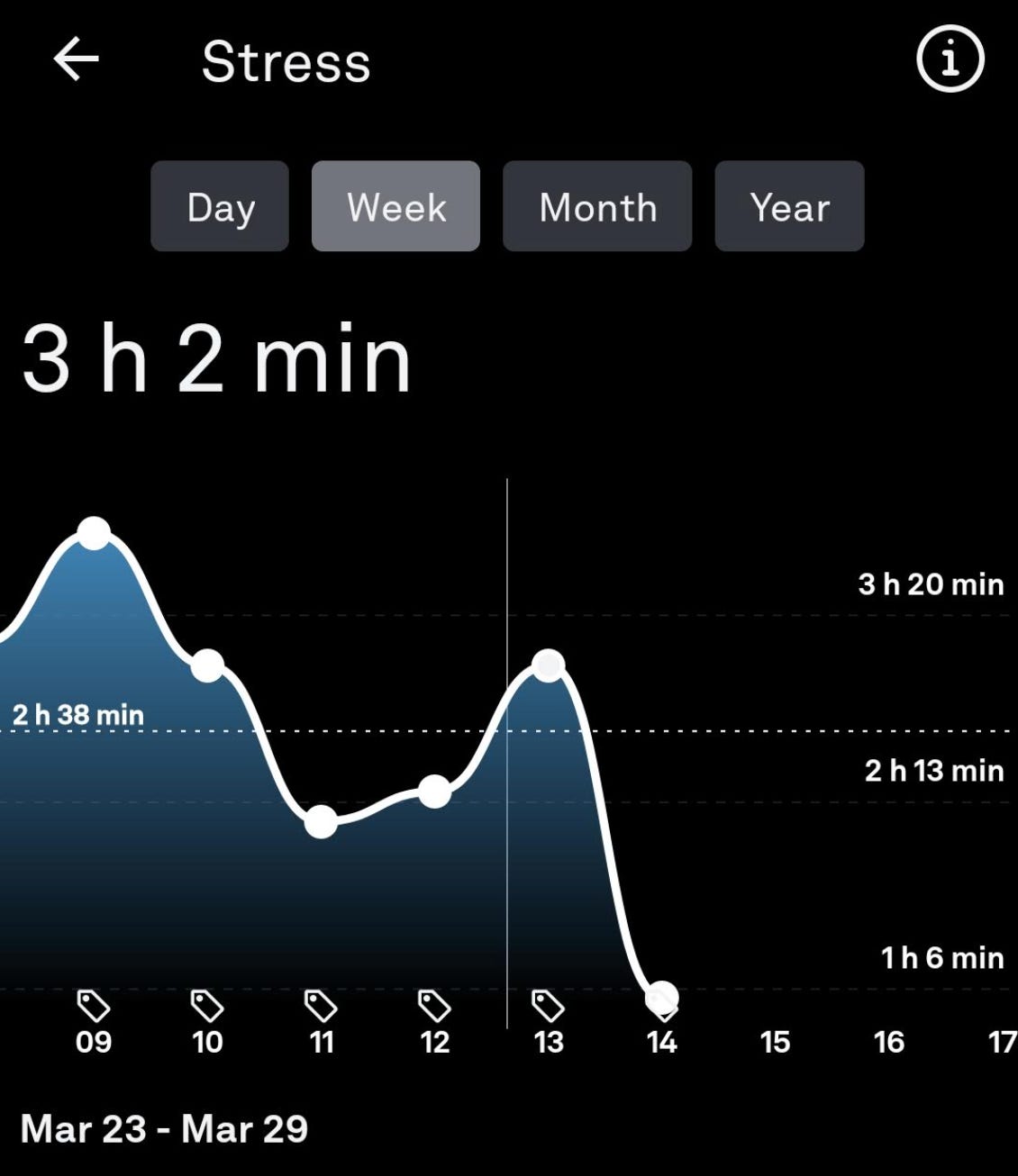How to stress out, effectively - Part 1
In this 3 part series, we'll first explore the physiology of stress, then how you can maximize good stress, and finally use it to unlock high performing teams.
Earlier this year, I received an Oura ring, as a gift from my husband. As a control and data lover, I was so excited to track my overall health metrics and trends. And so far, it’s been everything I wanted. While I’ve worn Android Wear devices for years, I could never get in the habit of sleeping with a watch (the size always felt big). Ring trend data has helped equip me to make better decisions to aid sleep, especially seeing the impact of eating or drinking alcohol late at night. It’s also helped me connect the dots between reproductive health and my ability to workout effectively.
One metric that has especially fascinated me is Stress. Oura uses your heart rate, heart rate variability (HRV), motion, and body temperature, to build a compound metric of physiological daytime stress. While stress also has a psychological component, which doesn’t manifest in Oura’s measures of physiology, the data is a helpful indicator of signals that we are under increased strain. With that in mind, the trend data has been the most fascinating: I discovered (not a surprise to anyone around me) that my stress levels are higher than average:
Over a period of five weeks, my daily averages revealed that my highest stress peaks were during workdays, especially when in the office (the worst day being 7 hours 45 mins of daytime stress). Much of that time sedentary. I also noticed my stress would rise during cooking, exercise, and watching my daughter play soccer. My average daytime stress is 2 hours 38 mins. Public data shows the average Oura daytime stress minutes is 1 hour 36 mins. Of course, my first instinct was to stress out at the delta :).
Upon further exploration with friends and family with health devices, and my own research, I found that higher levels of daytime stress weren’t abnormal. And that, in fact, a higher rate of daytime stress could have benefits to overall health and longevity. We often talk about stress as something to avoid: “don’t stress out”. And of course, there is plenty of data on the negative impacts of chronic stress on our health. However, stress also has a key role to play in helping us survive. And helping us to perform at our highest levels. And, as a lifelong observer of higher stress individuals, research shows that some of us are simply more prone to stress.
Do any of these sound like you? If so, you might be more prone to stress than most:
Intense Emotional Reactions: You find yourself easily overwhelmed by minor setbacks, criticism hits hard, and your emotions swing rapidly.
Persistent Worry and Rumination: Your mind races with "what-ifs," replaying past events and anticipating future problems, making it hard to switch off even when you’re “relaxing”.
Physical Symptoms: Headaches, muscle tension, digestive issues, and sleep disturbances are frequent.
Perfectionism and High Sensitivity: You set impossibly high standards, critique yourself harshly, and often blur the lines between performance and self-worth.
While these are some of the negative indicators, stress also has positive indicators. In 1943 Southam and Ehrlich coined the term, hormesis. Hormesis describes the biological phenomenon where low doses of stressors, like psychological or physical strain, can trigger beneficial adaptive responses. While high and sustained doses become harmful. For example, a 2003 study by Calabrese highlighted that low doses of ionizing radiation, far below established safety limits, actually stimulated cellular repair mechanisms and enhance antioxidant defenses. His study contradicted the traditional linear model, which assumed any radiation exposure increases cancer risk proportionally. Hormesis is the foundation for many cancer and other cell regeneration therapies used today. Another study, in 2013 by Daniela Kaufer, at UC Berkeley found that short bursts of stress trigger the release of a protein, fibroblast growth factor 2 (FGF2), that encourages the creation of new brain cells, boosting memory and learning.
While short bursts of stress can have positive effects, stress is not something to “chase”. Ancient homo sapiens wouldn’t survive long by chasing after tigers. We don’t crave stress. We crave purpose, meaning, and growth. Which all entail enduring some stress. By chasing your purpose, you will be best equipped to handle the stress that occurs. Alternatively, by not being connected to your purpose, you run the risk of “avoidant'“ behavior when it comes to stress and living in a cycle of stress and activities to numb our emotions, a common result of burnout. If you haven’t defined your purpose, check out my series on the topic, or book an intro coaching call with me.
How are you currently tracking your stress levels and trends? If you’re not already, try using a smart device like a watch or a ring and monitor a few weeks of data. Or keep a journal next to your bed and observe how you feel at the end of each day, and review over time.
Next week, we will cover how to build in habits of hormesis and “eustress” (good stress) into your daily routine. And how to ensure you are using time for recovery. And finally in Part 3, we’ll examine how you harness good stress to maximize team performance. Wishing you all a relaxing weekend. With a little bit of stress :).
The Wake Up Top 5
What we’ve been loving this week
Read: Fascinating study on Women and Wealth trends from Bank of America.
Listen: How music stays the same across generations.
Cook: Made this Lasagna with both bechamel and ricotta and it was fantastic.
Watch: How humanity got hooked on coffee, from TedEd.
Learn: New words in 2025 from the Oxford English Dictionary.
If you’ve made it this far, know that I’m so grateful you spent your time reading The Wake Up when you could be scrolling on TikTok, YT, or Instagram or doing 100 other things as a busy, wonderful person. Thank you 💛 and let me know what you’d like to read next.






It's so cool being able to dig into the Oura trends but also important to contextualize what it's showing - mainly, that elevated stress doesn't automatically equal "bad." (Also...not me being 4-for-4 on your "you might be more prone to stress" list. 🥸 )